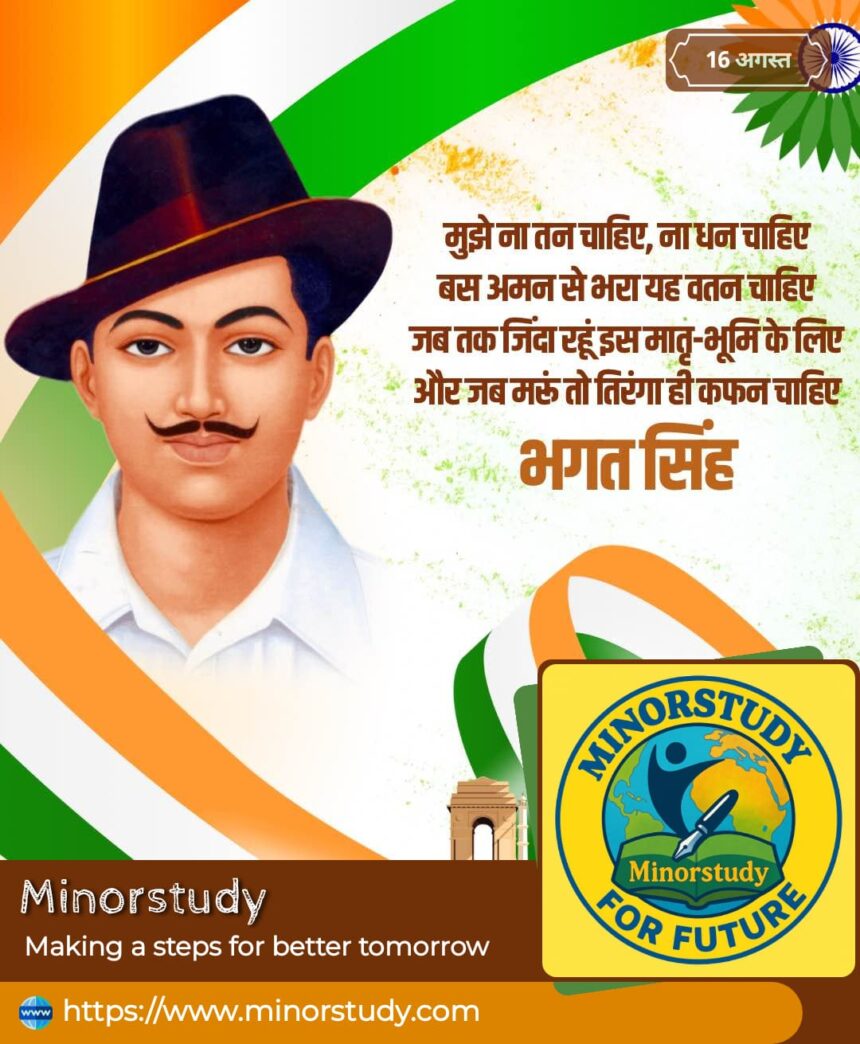5 Powerful Lessons From Bhagat Singh on Patriotism and Sacrifice
Bhagat Singh, one of India’s most iconic freedom fighters, exemplified courage, dedication, and selflessness. His words,
- History and Background of Bhagat Singh
- Timeline of Bhagat Singh’s Life
- Key Facts About Bhagat Singh
- Significance of the Quote
- 5 Lessons From Bhagat Singh’s Life
- 1. Courage Beyond Fear
- 2. Sacrifice is Central to Patriotism
- 3. Youth Can Drive Change
- 4. Actions Speak Louder Than Words
- 5. Idealism with Practical Action
- FAQs About Bhagat Singh
- Daily Life Lessons From Bhagat Singh
- Societal and Cultural Impact
- Wishing and Celebrating Bhagat Singh
- Important Points to Remember
- Conclusion: Bhagat Singh’s Enduring Legacy
“I neither want body nor wealth, I just want this country full of peace, as long as I am alive I want this motherland and when I die I want the tricolor as my shroud,”
reflect his unwavering commitment to the nation above personal gain or life itself. Bhagat Singh’s life continues to inspire patriotism, ethical action, and social responsibility for generations.
This article explores Bhagat Singh’s life, historical context, key facts, the significance of his quote, societal impact, practical lessons, and FAQs, written in a human-friendly style.
History and Background of Bhagat Singh
Bhagat Singh was born on 28 September 1907 in Banga, Punjab, into a family deeply involved in India’s freedom struggle. Influenced by patriotic values and revolutionary ideals, he became a symbol of youthful rebellion against colonial oppression.
From an early age, he demonstrated intellectual curiosity, courage, and commitment to social justice. Bhagat Singh was influenced by Marxist ideas, revolutionary literature, and leaders like Lala Lajpat Rai, which shaped his philosophy of sacrificial service for the nation.
Timeline of Bhagat Singh’s Life
1907: Born in Banga, Punjab.
1923: Participated in student protests against British policies.
1928: Played a key role in protesting the death of Lala Lajpat Rai by the British police.
1928: Involved in the Assembly bombing protest to awaken public consciousness.
23 March 1931: Executed by hanging at the age of 23, becoming a martyr for India’s independence.
Key Facts About Bhagat Singh
Known as the “Shaheed-e-Azam” (Great Martyr) for his sacrifices.
Advocated youth participation, revolutionary action, and social justice.
Believed that personal life, wealth, and comfort were secondary to the nation’s welfare.
Emphasized peaceful ideals alongside revolutionary activism to inspire public awareness.
His writings and speeches continue to motivate social responsibility and patriotism.
Significance of the Quote
Bhagat Singh’s quote conveys several profound meanings:
Selflessness: True patriotism demands putting the nation above personal comfort, wealth, or life.
Peace as a Priority: His ultimate goal was a peaceful and just nation, showing that freedom includes social harmony.
National Symbolism: Wanting the tricolor as his shroud reflects deep reverence for India and symbolic immortality in national memory.
Timeless Inspiration: His words encourage citizens to dedicate themselves ethically and courageously for societal and national well-being.
5 Lessons From Bhagat Singh’s Life
1. Courage Beyond Fear
Bhagat Singh demonstrated that true courage involves standing for justice even in the face of death, inspiring generations to act fearlessly.
2. Sacrifice is Central to Patriotism
He lived and died for India, showing that sacrifice is an integral part of serving the nation.
3. Youth Can Drive Change
Bhagat Singh’s life proves that young minds can bring revolutionary change when guided by ethics and commitment.
4. Actions Speak Louder Than Words
Through bold actions like protests and writings, he communicated his beliefs effectively, showing that real service requires active engagement.
5. Idealism with Practical Action
He combined visionary ideals of peace and equality with practical efforts to challenge oppression, reminding us that freedom is achieved through both thought and action.
FAQs About Bhagat Singh
Q1: Who was Bhagat Singh?
A: He was a revolutionary freedom fighter known for youthful courage, selflessness, and martyrdom in India’s struggle against British rule.
Q2: What does this quote mean?
A: It highlights sacrificial patriotism, prioritizing national peace and freedom over personal life or wealth.
Q3: Why is Bhagat Singh significant?
A: He became a symbol of courage, dedication, and ethical activism, inspiring citizens to act selflessly for the nation.
Q4: How did he serve India?
A: Through protests, revolutionary writings, and raising public awareness against colonial oppression.
Q5: What lessons can modern readers learn?
A: Courage, selflessness, ethical activism, youth empowerment, and dedication to justice are timeless lessons.
Daily Life Lessons From Bhagat Singh
Serve Without Expectation: Dedicate time, skills, and effort to societal welfare without seeking personal reward.
Be Courageous: Stand up against injustice, discrimination, and oppression in everyday life.
Value Principles Above Material Wealth: Prioritize ethics, integrity, and morality over material gain.
Lead by Example: Inspire others through action rather than just words.
Empower Youth: Encourage young people to think critically, act ethically, and contribute to positive change.
Honor National Symbols and Ideals: Respect the values, culture, and symbols that represent unity and freedom.
Societal and Cultural Impact
Bhagat Singh remains a symbol of revolutionary courage, sacrifice, and ethical patriotism.
His ideals continue to inspire youth movements, educational programs, and civic initiatives in India and abroad.
Annual commemorations, literature, and films celebrate his life, reminding society of the cost of freedom and the importance of service.
His emphasis on peaceful ideals alongside revolutionary action continues to guide ethical activism globally.
Wishing and Celebrating Bhagat Singh
“May Bhagat Singh’s courage and dedication inspire you to act selflessly and serve your community and nation.”
“Let his life remind us that true patriotism involves sacrifice, ethical action, and unwavering commitment to justice.”
His legacy encourages commemorative events, educational workshops, and youth empowerment programs, ensuring his values remain alive.
Important Points to Remember
Patriotism is measured by selflessness and dedication, not personal gain.
Courage, sacrifice, and ethical action are essential components of true freedom and service.
Youth can drive transformative change when guided by ethics, awareness, and commitment.
National symbols, like the tricolor, represent unity, courage, and the collective struggle for freedom.
Bhagat Singh’s life teaches that freedom and peace require continuous effort, moral integrity, and social responsibility.
Conclusion: Bhagat Singh’s Enduring Legacy
Bhagat Singh’s words and life remind us that true patriotism is selfless, courageous, and principled. His quote,
“I neither want body nor wealth, I just want this country full of peace…”,
underscores that personal comfort and material gain are secondary to the welfare of the nation. By embracing his ideals, individuals can contribute ethically to society, uphold justice, and honor the sacrifices of those who fought for freedom.
Bhagat Singh’s legacy continues to inspire courage, ethical activism, and youth empowerment, guiding future generations toward a peaceful, just, and free society.








